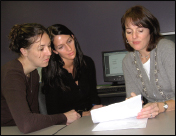Giving Kids a Chance at Childhood
- Joseph Kozakiewicz
- School of Social Work
- Colleges of Law and Social Science

Staff attorney Delanie Pope (on right) reviews documents with students in the Chance at Childhood program.
For its mission, the Chance at Childhood program seems remarkably small. Staffed by four full-time members and a varying number of students (16 in 2006-2007), the program is an outcome of a child advocacy commission designated in 1998 by Connie Binsfeld, former Michigan lieutenant governor, to make recommendations for improving the status of children caught in Michigan's legal system.
Chance at Childhood trains students and professionals in law and social work to cooperate with one another. The director of the program, Joseph Kozakiewicz, holds appointments in both Social Work and Law.
Historically, lawyers and social workers have been at odds because of differences in their educational backgrounds. Social workers tend to be unfamiliar with the Socratic method, which provides the basis for most legal education and investigation. Law students, in turn, are unfamiliar with the perspectives that inform the practice of social work. Chance at Childhood presents students with an interdisciplinary view.
In addition to completing required courses in disciplines other than their own, students in the program work in interdisciplinary teams and are assigned a variety of cases each semester. For this process to be successful, the partnered law and social work students must agree when drafting court reports and making recommendations regarding the children they represent. They are not allowed to draft only the portions that address their own specialized training; cooperation is required throughout the work.
"Program alumni," Kozakiewicz said, "have reported that they are more knowledgeable and comfortable working in the field given the experience they obtained through Chance at Childhood." He also noted that "student work has positively impacted the legal system itself. Judges and court staff have been thoroughly impressed with the students' professionalism and ability to advocate effectively for children."
As Kozakiewicz and his staff, including Educational Program Director Kim Steed and Attorney Delanie Pope, have developed relationships with various courts, other courts have begun to contact them in search of new or additional services.
Ingham County, for example, recently approached them to begin a supervised parenting time program. In most cases it is important for children to interact with both parents. However, one parent may be considered unfit to parent safely because of a criminal record or a history of domestic or substance abuse. In these cases, the courts require a supervisor to be present when the child interacts with that parent.
Previously, parents had relied on independently paid supervisors. Many parents could not afford the fee and thus the amount of time they could spend with their child was severely limited. Now, with funding provided by a grant from the State Court Administration Office, students in the Chance at Childhood program are supervising parental visits. While the students can only handle a limited number of cases, the program enables more parents to spend time with their children in a safe environment. This is the only initiative of its kind in the nation that is run through a university program.
Kozakiewicz and his team continue to tweak their program each year. "Our job is primarily as educators," Kozakiewicz said. "It's a challenge to continue balancing the education of students with meeting the overwhelming community needs in this field."
- Written by Lisa Eldrid, University Outreach and Engagement